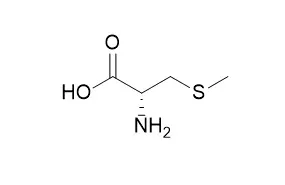| In vitro: |
| Journal of Neuroence the Official Journal of the Society for Neuroence, 2007, 27(47):12808-16. | | Methionine sulfoxide reductase A and a dietary supplement S-methyl-L-cysteine prevent Parkinson's-like symptoms.[Pubmed: 18032652] | Parkinson's disease (PD), a common neurodegenerative disease, is caused by loss of dopaminergic neurons in the substantia nigra. Although the underlying cause of the neuronal loss is unknown, oxidative stress is thought to play a major role in the pathogenesis of PD. The amino acid methionine is readily oxidized to methionine sulfoxide, and its reduction is catalyzed by a family of enzymes called methionine sulfoxide reductases (MSRs). The reversible oxidation-reduction cycle of methionine involving MSRs has been postulated to act as a catalytic antioxidant system protecting cells from oxidative damage.
METHODS AND RESULTS:
Here, we show that one member of the MSR family, MSRA, inhibits development of the locomotor and circadian rhythm defects caused by ectopic expression of human alpha-synuclein in the Drosophila nervous system. Furthermore, we demonstrate that one way to enhance the MSRA antioxidant system is dietary supplementation with S-Methyl-L-cysteine (SMLC), found abundantly in garlic, cabbage, and turnips. SMLC, a substrate in the catalytic antioxidant system mediated by MSRA, prevents the alpha-synuclein-induced abnormalities.
CONCLUSIONS:
Therefore, interventions focusing on the enzymatic reduction of oxidized methionine catalyzed by MSRA represent a new prevention and therapeutic approach for PD and potentially for other neurodegenerative diseases involving oxidative stress. |
|






 Cell. 2018 Jan 11;172(1-2):249-261.e12. doi: 10.1016/j.cell.2017.12.019.IF=36.216(2019)
Cell. 2018 Jan 11;172(1-2):249-261.e12. doi: 10.1016/j.cell.2017.12.019.IF=36.216(2019) Cell Metab. 2020 Mar 3;31(3):534-548.e5. doi: 10.1016/j.cmet.2020.01.002.IF=22.415(2019)
Cell Metab. 2020 Mar 3;31(3):534-548.e5. doi: 10.1016/j.cmet.2020.01.002.IF=22.415(2019) Mol Cell. 2017 Nov 16;68(4):673-685.e6. doi: 10.1016/j.molcel.2017.10.022.IF=14.548(2019)
Mol Cell. 2017 Nov 16;68(4):673-685.e6. doi: 10.1016/j.molcel.2017.10.022.IF=14.548(2019)